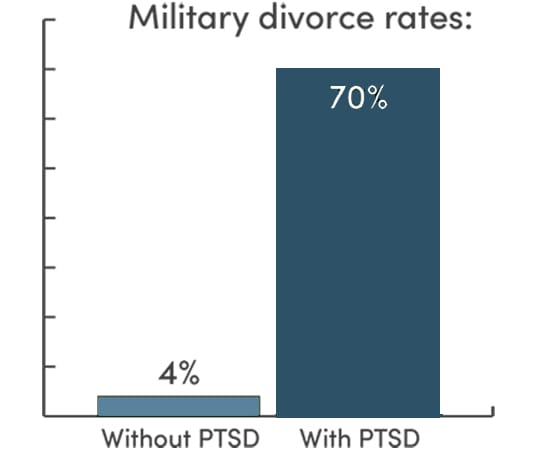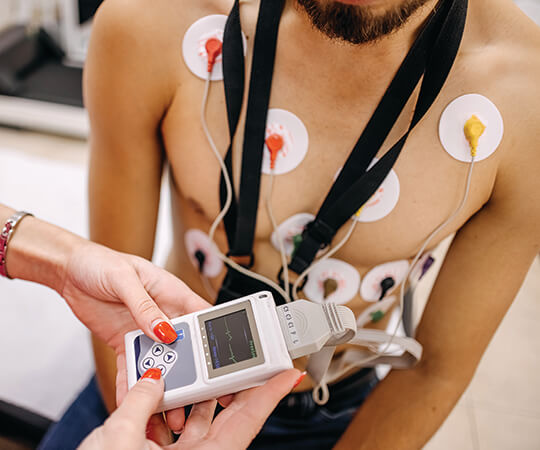Post Traumatic Stress
Disorder (PTSD) can last a lifetime, left unaddressed.

How combat trauma destroys families

VIOLENCE:
55% have a physical altercation
13% report violence DAILY

TRAUMATIZED SPOUSES:
39% have secondary PTSD

DIVORCE:
4% vs 70% with PTSD
You don’t have to go to war to suffer from PTSD
It’s not uncommon for veterans to return from combat with the trauma of war deeply affecting them in the form of PTSD, depression, anxiety, and more. When a veteran is suffering from the impacts of military trauma, they can inadvertently pass this trauma onto those closest to them. This “secondary PTSD” can affect the entire veteran family and can even be passed on through generations when left unaddressed. If you have experienced or witnessed additional trauma in your early life, you are even more likely to have PTSD as an adult.
Symptoms of secondary PTSD include issues sleeping, depression, anxiety, numbness, hopelessness, trouble making decisions, headaches, anger, suicidal thoughts, and more. Download this PTSD Checklist for a broader list of symptoms.
The invisible epidemic
Secondary PTSD among veteran spouses is widespread, but it often goes unacknowledged in the conversation about military trauma. It is estimated that at least a third of veteran spouses are dealing with some form of secondary trauma and are also less likely to seek treatment than the veterans they’re supporting. Secondary PTSD is our primary concern, and it is no less important to address than the direct impacts of combat trauma.
A medical condition, not a personal flaw
PTSD is not a choice. It is an automatic, hard-wired response to experiencing a traumatic event or being exposed to prolonged stress. It can be the result of constantly “walking on eggshells” in your own home and long periods remaining on high-alert for conflict. If you’re struggling with secondary trauma, you can’t think or will your way out of it. Addressing PTSD requires the slow and intentional rewiring of patterns caused by a constant or extreme state of stress. It’s okay to ask for help.
If you don’t get treatment, can last a lifetime
If you are experiencing the impacts of trauma, don’t push them down or ignore them, hoping they will get better on their own. Unless treated, PTSD can be a life sentence. 271,000 Vietnam veterans still have PTSD 50 years later, and multiple generations of family members are still paying the price. Research has shown that a parent with PTSD can inadvertently pass it down to their children and their grandchildren genetically, and epigenetically. Left untreated, your trauma can literally end up encoded into the DNA of your family line.
You can’t help someone with PTSD until you heal your own PTSD
As the spouse of a service member, you are probably used to putting the needs of your veteran loved one, your children, and your family first. You may feel like you owe it to everyone to carry the weight of your trauma and the responsibility for your family single handedly and silently. It might feel like there’s no time or space for the vulnerability required to work through personal trauma or care for yourself. We’re here to tell you that you deserve to heal from trauma and that, in fact, doing so is a critical step towards effectively caring for those you love most.
Don’t try to go it alone
Everything from our retreats to our group offerings to our coaching practices are designed around the principle that healing happens in community. There is a whole community of veteran spouses that can relate to what you’re going through. Sometimes the biggest hurdle is reaching out for support, which is why we offer free, weekly group calls that you can drop into when you’re feeling ready or are needing support. Learn more here.
Psychedelic programs can help

They help reset and increase neural connections allowing the brain to develop new thought patterns and let go of old traumatic ones.

Psychedelic retreats in other countries are available through The Hope Project for veteran spouses like you.
The latest research shows that our programs are 80% effective vs standard 10% effectiveness
HHP just conducted a large observational study of over 400 veterans in real-world, HHP program settings.


If you’ve tried traditional therapies without success, don’t give up hope. These new programs are 8 times more effective than standard treatments of talk therapy and prescription medications. Apply now for a psychedelic retreat or check out all of our program offerings.
